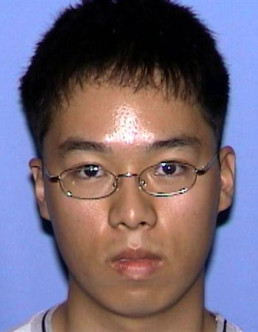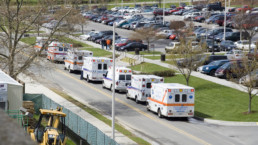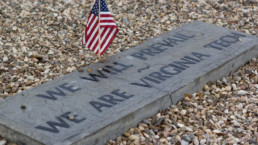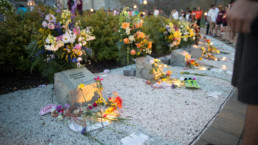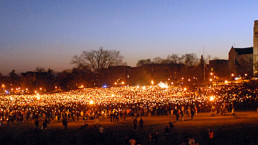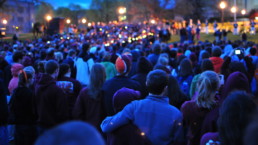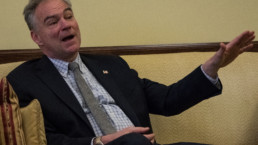Seung-Hui Cho, who killed himself in addition to 32 others during the April 16 shooting, was afflicted by serious mental health issues that went unaddressed. The state and Virginia Tech led the way in response to and prevention of campus crises across the nation.
CHO'S MENTAL HEALTH HISTORY
Seung-Hui Cho entered Virginia Tech as a freshman in the fall of 2003 as a business information technology major in the Pamplin College of Business; although, he eventually switched into the English department. A graduate of Westfield High School, Cho was born in South Korea but grew up in northern Virginia.
According to the Governor’s Panel that investigated the April 16 shooting, during middle and high school, Cho exhibited signs of mental illness. He originally only received treatment for selective mutism and depression, but then teachers noticed suicidal and homicidal ideations in his writing in the aftermath of the Columbine shooting in 1999.
Upon discovering his fantasies after the Columbine shooting, Cho was given psychiatric counseling and was put on medication for a short period of time. These homicidal fantasies following the shooting, however, were apparently unknown to Cho’s parents.
According to The New York Times, Cho also encountered bullying for his mute condition; and when he did speak, students made fun of his voice.
When Cho came to Virginia Tech, the university did not have access to his previous history of mental health, including the information that his high school had gathered over the years. His family members, however, were aware of his mental state and supported him as best they could.
“(Cho’s) parents were pretty remarkable,” said Christopher Flynn, director of Cook Counseling Center both currently and during April 16, 2007. “They knew about his emotional difficulties. When he was a freshman, they drove down here every weekend to see him. They drove from northern Virginia down every Sunday, spent time with him, and turned around and drove back, so that they could help him.”
In 2005, during Cho’s junior year at Virginia Tech, he was admitted to Carilion Clinic Saint Albans Hospital and stayed overnight. On the morning of Dec. 13, 2005, the Virginia Tech Police Department (VTPD) was contacted because a female Virginia Tech student complained that Cho was harassing her. According to the student, Cho was sending her unwanted instant messages and left a message on a dry erase board outside of her dorm. Additionally, VTPD had been previously contacted about Cho by one of his roommates, to whom Cho had sent a message expressing suicidal thoughts.
Cho was evaluated at the Carilion New River Valley Medical Center and he received the diagnosis of mood disorder. At this time, he denied having any suicidal thoughts and claimed that the entire incident was a joke. After his discharge, follow-ups and aftercare were to be coordinated with Cook Counseling Center.
Cho also engaged in phone triages with Cook Counseling Center both before and after his admittance to Saint Albans including on Nov. 30, 2005; Dec. 12, 2005; and an in-person follow-up on Dec. 14, 2005. During his triage on Dec. 14, counselor Sherry Lynch Conrad encouraged Cho to return for an appointment in January after winter break. This appointment, however, was never scheduled.
Seung-Hui Cho
CHO'S TIME AT VIRGINIA TECH
Within the English department, professors encountered issues with Cho in class and recognized his need for counseling. Professor Ed Falco had Cho as a student in creative writing.
“We’re a relatively small community in creative writing, and so I knew the other professors, and I had already talked to them early on to decide whether or not I should let him take my class. And I had learned that one of the professors, Lisa Norris, offered to walk him over to the counseling center. And others had offered to help him in any way they could in terms of getting counseling for his issues.
“So I knew that others had already done those kinds of interventions, but not because they were worried about him hurting anybody, but just because he obviously had some sort of issue, some sort of developmental issue that kept him from speaking,” Falco said.
In his senior year, Cho took a playwriting workshop taught by Falco.
“He didn’t speak at all in class, and so the first thing I did was try to talk to him afterwards because usually if you have a student who’s very shy, or has some sort of issue, you can just talk to them one-to-one … I remember he was clearly different. You know, one of the things you’ll do with a student who is inward and not communicating is you might initiate some contact. And I remember putting my hand on his arm, and instead of the kind of opening up you might feel, he just sort of shut down, locked up. Obviously he didn’t like it, so I took my hand away. Immediately.
“I talked to other people because I didn’t see how he could be in my workshop … I talked to other creative writing professors and learned that he was a senior, and had already been through the other workshops, and that they had all made accommodations for him. And so I considered it a health issue, a handicap, and agreed to sort of work around it. So he didn’t speak during the class, but he turned in written responses to the plays,” Falco said.
Ed Falco
Professor Ed Falco speaks about the impact April 16, 2007, had on the Virginia Tech community.
According to Falco, Cho sat quietly during each class, wearing a baseball cap, and had virtually no interaction with the other students.
After the shooting, one of Cho’s former classmates in Falco’s playwriting class sent two plays that Cho wrote, “Richard McBeef” and “Mr. Brownstone,” to AOL News. According to the former classmate, Ian MacFarlane (who was also an employee of AOL News), “When I first heard about the multiple shootings at Virginia Tech yesterday, my first thought was about my friends, and my second thought was, ‘I bet it was Seung Cho,’ … When we read Cho’s plays, it was like something out of a nightmare. The plays had really twisted, macabre violence that used weapons I wouldn’t have even thought of.”
Falco also described Cho’s plays as violent, but said that the works were immature.
“It just seemed like immature writing. Writing in a fantastical manner. Very unskilled and uncontrolled, but nothing that was a red flag,” Falco said.
"Mr. Brownstone," one of two plays submitted to AOL News by Cho's classmate, Ian MacFarlane.
The second play submitted to AOL News by MacFarlane, entitled "Richard McBeef."
Falco emphasized that Cho’s violent writing was never a real concern.
“We began to talk about what if a student turns in disturbing writing. It’s a very complicated issue for creative writers because writing can be violent. Just because you write something that’s violent doesn’t mean that you’re violent … If Toni Morrison had written a scene like she wrote in ‘Beloved,’ where the mother takes a hack sword to the child’s neck and kills them, would we have turned her in and said, ‘Sorry this is a dangerous writer?’ No, and that scene is relevant to the story she wrote because it’s necessary. There’s lots of violence that turns up in writing, the question is, is it literary?”
Falco also emphasized that he did not feel guilty for not knowing what his former student would do, and urged his students not to feel guilty as well.
“I wrote them all an email telling them that … it doesn’t do anybody any good to review, to take on a sense of guilt over what happened, there was nothing that happened in that classroom that they could have changed … he was a strange student, and that’s all we knew about him.
“In 33 years of students, I’ve had a handful of students who were different and strange, but none of them committed acts of violence. They were just odd. There’s got to be room in the world for odd people and for people who don’t fit. You don’t pull them all out, stick them in a corner some place.”
In 2005, while Lucinda Roy served as the chair of the English department, she encountered issues with Cho, according to her book “No Right to Remain Silent.” She alerted the Division of Student Affairs, the Cook Counseling Center, the College of Liberal Arts and Human Sciences and the VTPD about her concerns.
Roy contacted VTPD because of a poem he wrote in a poetry class.
“(Cho) had read the poem aloud in class, and although his piece could perhaps be viewed as immature student venting, it could also be interpreted in a more threatening way,” Roy wrote.
Additionally, according to Roy’s book, he took photos of girls in class, sometimes from under his desk, without their permission.
Cho, however, was unwilling to go to the Cook Counseling Center, and Tech policies did not allow someone to be treated unless he or she went in voluntarily.
Ed Falco speaks about the need to resist fearing odd people after the April 16 shootings.
VIRGINIA TECH'S RESPONSE
In the aftermath of the shooting, the families of two victims, Julia Pryde and Erin Peterson, filed identical lawsuits regarding negligence against agents and individuals employed by Virginia Tech, including the Cook Counseling Center and a few of its counselors.
One of the allegations of negligence regarding the Cook Counseling Center was that counselors should have followed up with Cho after his final meeting at Cook. Many had the idea that Cho had interacted with the Cook Counseling Center on many occasions; however, in reality, Cho only visited Cook in person once.
“There was a lot of miscommunication about what the role of the Cook Counseling Center was,” Flynn said. “I think if you read some books on the subject or some of the interviews at the time with people, they would say that Mr. Cho had multiple contacts with the Cook Counseling Center. That’s not actually true … Mr. Cho was referred to the Cook Counseling Center on a number of occasions, but he called for telephone triages, talked to one person. They made an appointment (for Cho), he didn’t show up. We followed up and talked with him again, he didn’t show up for a follow-up interview, and then he was hospitalized. This was back in (2005).
“On the day he was discharged from the hospital, it was the last day of exams at Virginia Tech, so he came and met with a counselor who did not know about the hospitalization nor had she had any history (on Cho’s mental health). It was the last day of classes so he was going home immediately afterwards. He went home, a month later he returned and then he did not contact the Cook Counseling Center again … We had no particular reason (to follow up), I think it would have been helpful, of course, that he come in, and I think everyone agrees he could have used the assistance, but he did not follow up.”
Christopher Flynn from Cook Counseling Center addresses the university at a press conference on April 19, 2007.NICK JERMIAH / COLLEGIATE TIMES
In the aftermath of the shooting, it was discovered that several of Cho’s files had been missing. According to Flynn, his staff spent 100–150 hours searching through files to ensure that they were not simply misplaced and were actually missing.
Then, six months later, an attorney representing Robert Miller, who was the former director of Cook Counseling until he was fired in 2005, called Flynn to inform him that he had the missing files. According to the Washington Post, “Miller said he found Cho’s medical records, long thought to be lost, in his home in July while looking for documents relevant to the lawsuit (referring to the lawsuits filed by the Pryde and Peterson families).”
When asked about the discovery of Cho’s missing files in Miller’s home, Flynn defended Miller.
“There was no gain to be had … Why this person? Of all the files, why would that one — but he had left the year before, right, so he had been gone a year. So why? He wouldn’t even know to hide it … I mean, his story had every bit of truth associated with it. It was unfortunate, but, you know, when things go wrong, they go wrong in a big way. It’s always that way,” Flynn said.
Additionally, following the shooting, several panels, including the Governor’s Panel, an internal panel and the Office of the Inspector General’s panel, investigated the shooting to determine how to prevent a tragedy of this sort from happening again.
The panels determined that one of the main ways Virginia Tech could improve was in terms of communication. Had one counselor had access to all of Cho’s files, there is no telling if said counselor could have determined Cho to be a threat, but this counselor certainly would have had a better picture of him as a whole.
According to Sen. Tim Kaine, who was governor of Virginia at the time of the shooting, “We’ve made some improvements (since the shooting); in Virginia we passed a law … basically allowing colleges, after a student has been admitted, to get information about their medical history.
“One of the greatest ‘what ifs?’ is what if Virginia Tech had just known what the high school knew about how to help this young man manage his own mental illness and be successful? The lack of anybody ever calling this young man’s parents and saying we have a lot of suspicions about him — teachers, RAs, campus mental health — nobody reached out to the family and said, ‘Hey, you know what, maybe you should get down here and spend some time with your son.’”
Due to a misunderstanding of federal privacy laws at the time, the university was under the impression that it was forbidden from discussing Cho’s mental health with his parents.
The claims in the lawsuits, along with the panels of investigation, provided insight into how to prevent a tragedy of this kind from happening in the future, and how to respond, if it does.
“All of college mental health has changed since the incident. It’s not just the Cook Counseling Center,” Flynn said. “The shooting on our campus changed the face of prevention, intervention, crisis response, across the United States. It hasn’t just been us, but Virginia Tech has probably led the way in terms of changes to how we relate to, with departments among themselves, about sharing information, about being responsive to students, faculty and staff who may have difficulty. So, it wasn’t just the Cook Counseling Center, but we were really, those investigations I think were helpful in pointing the way and pointing the direction.”
Flynn addressed flaws in Cho’s treatment and how the university has responded in the aftermath of the shooting.
“Oftentimes, if a student is hospitalized and they get a temporary detention order and emergency custody order, there is a hearing that follows, where at those hearings we send our case manager there. We follow up with students to make sure they’re OK. So that this issue of follow up that Cho missed does not happen on our campus,” Flynn explained, referring to Cook’s failure to follow up with Cho when he did not schedule a next appointment.
He also expressed the ways in which Cook has grown following the tragedy.
“I would say that Cook was relatively understaffed when I started here. So, at that time, when I started in 2006, we had nine counselors. We have 24 counselors now. We had one person in psychiatry and we had one part-time person. We now have three. We have two full-time psychiatrists, full-time nurse practitioner and a part-time nurse practitioner. All of whom can prescribe medication. So, we have expanded outside of McComas. We have satellite clinics in East Eggleston, by the bookstore, Kent Square and in athletics, as well as drop-in centers at Vet-Med, Graduate Life Center and other places across campus. So, we are much larger and much more able to see students. Whereas we saw maybe 1,000 to 1,500 students back then. Last year we saw 4,000 students. We see a lot of students here,” Flynn said.
Since the tragedy, Flynn has shared his insights in responding to campus crises. One way he has done so is by co-authoring a piece with Micky Sharma, director of counseling and consultation at The Ohio State University, titled “Mental Health Aspects of Responding to Campus Crises.” In this piece, Flynn and Sharma explain how and provide tips to best respond to tragedies on college campuses.
All in all, however, Flynn believes that under the circumstances, Virginia Tech responded very well.
“I think that Virginia Tech did an amazing job,” Flynn said. “I think there’s always things that could be improved, right? So that’s why we do these after-action reviews, we go back and do a lot of that, I would say that in the aftermath of the shooting here, whenever there was a shooting on other campuses, they would call. I went to a number of sites where there had been shootings and in the aftermath have consulted with a number of universities.”
The case notes from the lawsuit filed by the Pryde family against the Commonwealth of Virginia.
Christopher Flynn Interview
Christopher Flynn discusses the changes to mental health evaluations in the wake of April 16, 2007.
CHO, A STUDENT IN PAIN
According to the Roanoke Times, “Cho’s family fled their Northern Virginia home and media glare for a few months in 2007, but eventually moved back. They live there still. No one in the neighborhood really talks about the shooting anymore.”
While Cho’s family has not been outspoken regarding the incident, they are still remembered every year during the anniversary of the shooting.
“I do feel for his parents. Always,” Flynn said. “You know, I mean, and his sister. I mean what have they gone through? What hell do they live in? They had a huge loss too.”
Cho was a victim of serious mental illness, which unfortunately went for the most part unaddressed.
“We shouldn’t forget that he committed suicide, there was some pain that was driving him,” Flynn said.
Mental illness remains a prevalent issue in the United States, and mental health problems can have severe consequences, should they go untreated. Methods to recognize, treat and respond to affected individuals are constantly being improved. Although good has come out of the tragedy in terms of prevention and response to campus crises, the Virginia Tech community is still experiencing the aftermath of the shooting.
“It was like a horror story sort of just injecting itself into your life. The very fabric of the community got ripped by the event. It got torn by the event. And I don’t think the people who were here can ever quite get over it,” Falco said.

